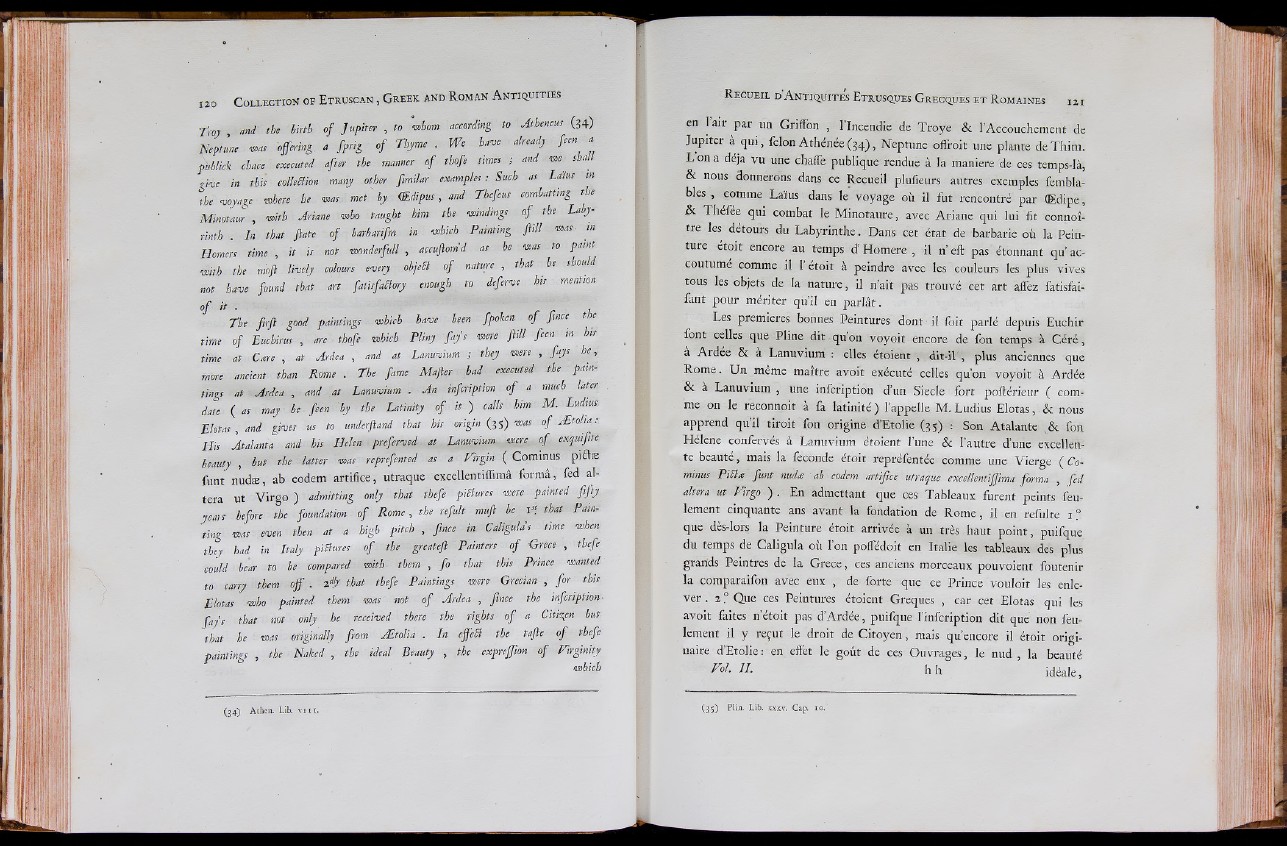
i’ll ip»
Î1 Α F>
'''Il
I
I
Troy and the lirth o f Jupiter , to whom according to Athcneus (34)
Neptune was offering a fpr.g o f Thyme . We have already feen a
publick chace executed after the manner o f thofe times ; and w e s a
give in this colleBion many other fmilar examples: Such as Lams m
the voyage where he was met by (Edipus, and Thefeus combatting the
Minotaw , with Arianc who taught him the windings o f the Labyrinth
. In that ftate o f barbarifm in which Painting ftill was- tn
Homers time , it is not wonderfull , accuftornd as he was to paint
with the moft lively colours every objcB o f nature , that he should
not have found that art fatisfaBory enough to deferve h s mention
^ The firft good paintings which have leen fpoken o f fmce the
time of Eucbirus , are thofe which Pliny fays were ftill feen m his
time at Cxrc , at Ardca , and at Lanuvium ; they were , fays be,
more ancient than Rome . The fame Mafter bad executed the paintings
at Ardea , and at Lanuvium . An infcription o f a much later
date ( as may be feen by the Latinity o f it ) calls him M . Ludius
Elotas, and gives us to underftand that his origin (3 f ) was of M o lia :
His Atalanta and his Helen preferved at Lanuvium were o f exquiftte
beauty , but the latter was reprefented as a Virgin ( Comitius piftfE
flint nud*, ab eodem artifice, utraque excellentiflima forma, fed altera
ut Virgo ) admitting only that thefe piBures were pamted fifty
years before the foundation o f Rome, the refult muft be A that Painting
was even then at a high pitch , fmce in Caligula's time when
they had in Italy piBures o f the greateft Painters o f Grece , theft
could bear to be compared with them , f t that this Prince wanted
to carry them off . x f i that theft Paintings were Grecian , for this
Elotas who painted them was not o f Ardea , fince the infcription.
fays that not only he received there the rights o f a Citffcn but
that he was originally from AEtolia . In effeB the tafte o f theft
paintings , the Naked , the ideal Beauty , the exprejfion o f Virginity
which
(3 4 ) Athen. Lib. v i i i .
en l’air par un Griffbn , l’Incendie de Troye & l’Accouchement de
Jupiter à qui, felon Athénée (34), Neptune offroit une plante de Thim.
L on a déjà vu une chalfe publique rendue à la maniéré de ces temps-là,
& nous donnerons dans ce Recueil plufieurs autres exemples femblables
, comme Laïus dans le voyage où il fut rencontre par (Edipe,
& Théfee qui combat le Minotaure, avec Ariane qui lui fit connoître
les détours du Labyrinthe. Dans cet état de barbarie où la Peinture
étoit encore au temps d’Homere , il n’ eft pas étonnant qu’ accoutumé
comme il f étoit à peindre avec les couleurs les plus vives
tous les objets de la nature, il n’ait pas trouvé cet art alfez fatisfai-
fant pour mériter qu’il en parlât.
Les premieres bonnes Peintures dont il foit parlé depuis Euchir
font celles que Pline dit qu’on voyoit encore de fon temps à Géré,
a Ardee & à Lanuvium ; elles étoient , dit-il , plus anciennes que
Rome. Un même maître avoit exécuté celles qu’on voyoit à Ardée
& a Lanuvium , une infcription d’un Siecle fort poftérieur ( comme
on le reconnoit à fa latinité ) l’appelle M. Ludius Elotas,, & nous
apprend qu’il tiroit fon origine d’Etolie (33) : Son Atalante fon
Hélene confervés à Lanuvhim étoient l’une & l’autre d’une excellente
beauté, mais la fécondé étoit repréfentée comme une Vierge ( Co-
minus P iB x funt nudx ab eodem artifice utraque excellentifflma forma , fed
altera ut Virgo ) . En admettant que ces Tableaux furent peints feulement
cinquante ans avant la fondation de Rome, il en refulte i °
que dès-lors la Peinture étoit arrivée à un très haut point, puifque
du temps de Caligula où l’on poifédoit en Italie les tableaux des plus
grands Peintres de la Grece, ces anciens morceaux pouvoient foutenir
la comparaifon avec eux , de forte que ce Prince vouloit les enlever.
2 ° Que ces Peintures étoient Greqiies , car cet Elotas qui les
avoit faites n’étoit pas d’Ardée, puifque l’infcription dit que non feulement
il y reçut le droit de Citoyen, mais qu’encore il étoit originaire
d’Etolie : en effet le goût de ces Ouvrages, le nud , la beauté
Toi. I I . h h idéale.
(3 5 ) Plin. Lib. xx xv . Cap. lo .